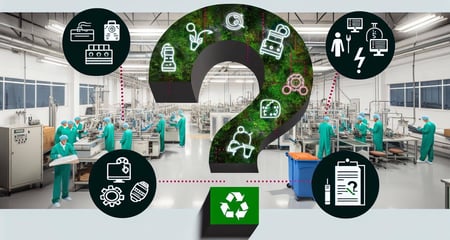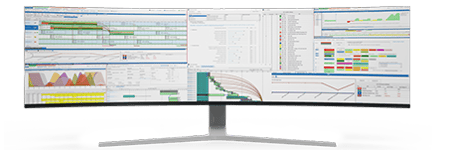Embracing Sustainability and Carbon Neutrality
The role of a Purchasing Manager in a medical manufacturing facility is more critical than ever. Beyond the traditional responsibilities of sourcing materials and managing suppliers, Purchasing Managers are increasingly tasked with driving sustainability initiatives and ensuring carbon neutrality within their supply chains.
As the world grapples with the urgent need to address climate change and environmental degradation, businesses are under mounting pressure to prioritize sustainability throughout their operations.
In this blog, we'll explore the significance of prioritizing sustainability and achieving carbon neutrality in the medical manufacturing industry. We'll delve into the challenges faced by Purchasing Managers in integrating sustainability practices into their procurement processes and examine how advanced planning and scheduling software, such as PlanetTogether, can facilitate this transition, particularly when integrated with leading enterprise resource planning (ERP) systems like SAP, Oracle, Microsoft, Kinaxis, and Aveva.

Why Prioritize Sustainability and Carbon Neutrality?
The medical manufacturing sector plays a vital role in society, producing life-saving products ranging from pharmaceuticals to medical devices. However, this industry also has a significant environmental footprint, with energy-intensive manufacturing processes, resource extraction, and waste generation contributing to greenhouse gas emissions and environmental pollution. Recognizing these challenges, many companies are embracing sustainability as a core business imperative.
Prioritizing sustainability offers numerous benefits, including:
Risk Mitigation: Embracing sustainable practices helps mitigate risks associated with regulatory compliance, resource scarcity, and reputational damage. Companies that proactively address environmental concerns are better positioned to navigate future regulatory changes and market disruptions.
Cost Savings: Sustainability initiatives often lead to cost savings through improved resource efficiency, waste reduction, and operational optimization. By minimizing energy consumption, water usage, and material waste, companies can achieve significant financial savings over the long term.
Enhanced Brand Reputation: Consumers, investors, and other stakeholders increasingly expect businesses to demonstrate a commitment to environmental stewardship. Embracing sustainability can enhance brand reputation, attract environmentally conscious customers, and drive loyalty and trust.
Innovation and Competitiveness: Sustainable practices stimulate innovation by encouraging companies to develop environmentally friendly products, processes, and technologies. By staying ahead of regulatory requirements and market trends, businesses can gain a competitive edge and seize new opportunities for growth.

Challenges Faced by Purchasing Managers
While the benefits of sustainability are clear, implementing and managing sustainability initiatives present numerous challenges for Purchasing Managers. Some common obstacles include:
Supply Chain Complexity: Modern supply chains are complex, spanning multiple geographies and involving numerous suppliers and partners. Coordinating sustainability efforts across this intricate network can be daunting, particularly when suppliers have varying levels of commitment to sustainability.
Data Visibility and Transparency: Achieving sustainability goals requires accurate data on environmental impacts throughout the supply chain. However, many companies struggle with limited visibility into their suppliers' operations and lack standardized metrics for measuring sustainability performance.
Resource Constraints: Purchasing Managers often face resource constraints, including budget limitations, time pressures, and competing priorities. Balancing sustainability objectives with cost considerations and operational efficiency can be challenging, particularly in a fast-paced manufacturing environment.
Integration Complexity: Integrating sustainability initiatives with existing procurement processes and systems poses another significant challenge. Legacy ERP systems may lack robust functionality for managing sustainability data, making it difficult to track and report on environmental metrics effectively.


The Role of Advanced Planning and Scheduling Software
Advanced planning and scheduling (APS) software, such as PlanetTogether, offers a powerful solution for addressing the challenges of integrating sustainability into procurement processes. By leveraging advanced algorithms and optimization techniques, APS software enables Purchasing Managers to:
Optimize Procurement Decisions: APS software provides real-time visibility into supply chain dynamics, allowing Purchasing Managers to make informed decisions that balance cost, quality, and sustainability considerations. By analyzing multiple scenarios and constraints, APS software helps identify opportunities to source materials from environmentally responsible suppliers and reduce carbon emissions.
Enhance Collaboration: APS software facilitates collaboration across internal teams, suppliers, and other stakeholders involved in the procurement process. By streamlining communication and information sharing, APS software fosters greater alignment on sustainability goals and ensures transparency throughout the supply chain.
Automate Reporting and Compliance: APS software automates the collection, analysis, and reporting of sustainability data, simplifying compliance with regulatory requirements and industry standards. By generating comprehensive reports on environmental performance metrics, APS software helps Purchasing Managers demonstrate their company's commitment to sustainability and carbon neutrality.
Integrate with ERP Systems: Perhaps most importantly for Purchasing Managers, APS software can seamlessly integrate with leading ERP systems such as SAP, Oracle, Microsoft, Kinaxis, and Aveva. This integration enables data synchronization between procurement and planning functions, ensuring that sustainability considerations are embedded into every aspect of the supply chain.
As Purchasing Managers in medical manufacturing facilities strive to prioritize sustainability and achieve carbon neutrality, they must overcome various challenges related to supply chain complexity, data visibility, resource constraints, and integration complexity.
Advanced planning and scheduling software, such as PlanetTogether, offers a powerful solution for addressing these challenges by optimizing procurement decisions, enhancing collaboration, automating reporting and compliance, and integrating with ERP systems.
By leveraging advanced technology and embracing a holistic approach to sustainability, Purchasing Managers can play a pivotal role in driving positive environmental change within their organizations and across the broader medical manufacturing industry.
Are you ready to take your manufacturing operations to the next level? Contact us today to learn more about how PlanetTogether can help you achieve your goals and drive success in your industry.